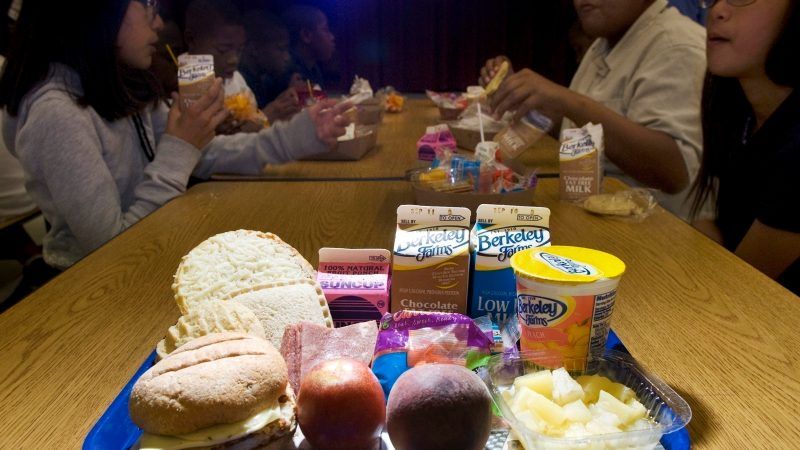No Matter Who Wins the Fight Over Trump's School Lunch Reforms, Kids Lose.
School lunches are unlikely to improve, whatever the lawsuit’s outcome.

Just days before many kids in the United States return to school from summer vacation, President Donald Trump's administration responded in the U.S. District Court for the Southern District of New York to a multi-state lawsuit challenging its watered-down requirements under the U.S. Department of Agriculture's (USDA) National School Lunch Program.
The lawsuit, which was filed earlier this year by attorneys general from several states, including California and lead plaintiff New York State, claims the Trump administration didn't take the proper steps to amend the rules, which the suit argues contravene the will of Congress. The suit claims the USDA's 2018 actions were not "'consistent with the goals of the most recent Dietary Guidelines for Americans' [nor] 'based on' the Nutrition Board's recommendations, as required by the School Lunch Act." The suit also alleges the rules are not—as required—based on "tested nutritional research." And it claims the amended requirements "significantly weaken the nutritional requirements for sodium and whole grains applicable to the school lunch" program.
The Obama administration's changes to the National School Lunch Program, championed by then-First Lady Michelle Obama and adopted in 2012, modified requirements for sodium, whole grain, milk, and fruits and vegetables served as part of the school lunch program. In 2018, the Trump administration rolled back many of those changes.
"The reforms were announced this week by new USDA Secretary Sonny Purdue under a plan to—honestly—'Make School Meals Great Again,'" I wrote in a 2017 column on the Trump administration's new approach. "That headline should tell you all you need to know about the Trump administration's plans."
Still, the inanity of Trump's plans doesn't mean the changes advocated by First Lady Obama and her husband's administration were any good. "[T]he Obama administration's food is not great food," I noted in 2017.
I've documented many of the problems with the USDA's National School Lunch Program over the years. In a 2014 column on the First Lady's school lunch reforms, I noted some of the flaws in those efforts: students and school districts fleeing the program in droves, soaring costs, and "unprecedented mountains of food waste." Claims that the quality of food served under the program improved after the First Lady's reforms are dubious, to say the least.
I've also noted many times, including in my recent book Biting the Hands that Feed Us: How Fewer, Smarter Laws Would Make Our Food System More Sustainable, how wresting the program from the USDA and shifting power over school food to local communities could be all that's needed to improve the foods students eat at school and cut down on the massive amount of food waste the problem causes.
The states sued the USDA last year under the legal theory of parens patriae, arguing that the states are acting on behalf (and representing the interests) of those who cannot speak for themselves; in this case, low-income families and their children who eat school lunches. "The 2018 Rule will expose children who live in the States and eat meals in schools to health consequences to which they would not have been exposed if USDA had not eliminated the final sodium target… and lowered the whole-grain requirement," the suit alleges.
This week's federal government response sought to pour cold water on that theory. As Reuters reported, the USDA argued in its response that "states have no power to sue over new rules they say make school meals less healthy."
Regardless of which side wins, the only sure losers are America's taxpayers and its schoolchildren. Many of the latter will have little choice but to eat the lousy food that's served in most public schools.
I argued two years ago that walking the school lunch program back a few years is a big idea only to small minds. That hasn't stopped New York, California, and a handful of other states from fighting with the USDA over school-lunch minutiae instead of implementing sorely needed, wholesale reforms to the program.


Show Comments (45)